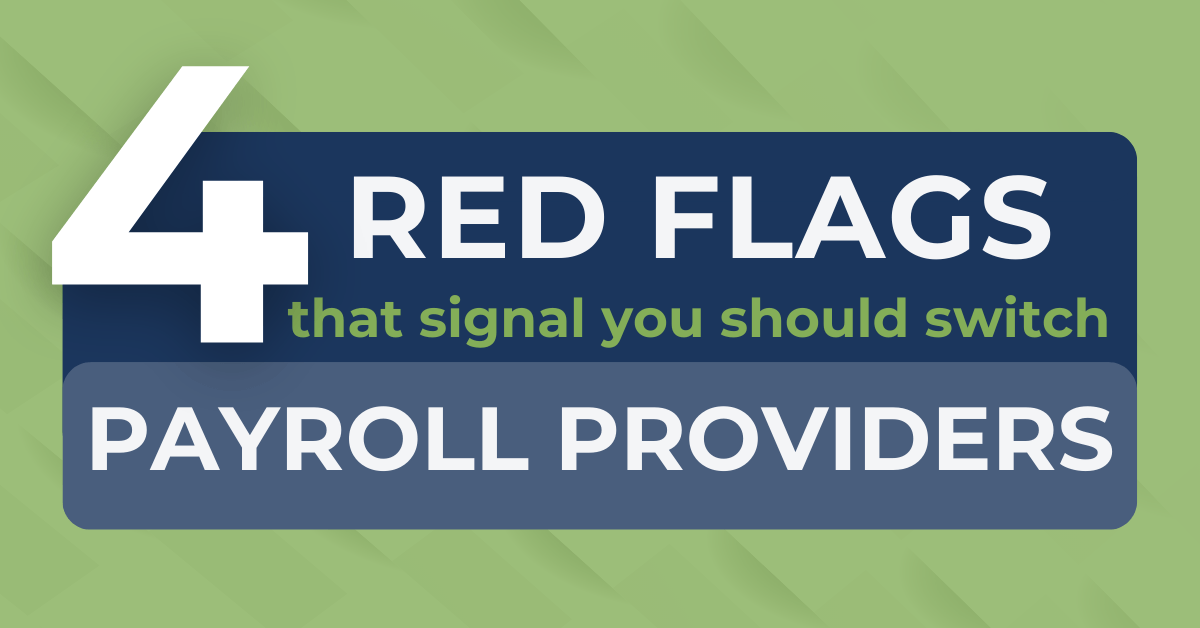4 Red Flags That Signal You Should Switch Payroll Providers
August 15th, 2024 | 3 min. read
By Shelby Betts

You just can't with your current payroll provider anymore.
You can't get someone to pick up the phone when you need help, or they've dropped the ball one too many times getting all your employees paid on time. Maybe your business is growing, and your current provider isn't keeping up.
The decision to switch is usually driven by frustration—the point where your payroll provider no longer meets your business's needs. Yes, change is tough, and the transition can bring temporary headaches, but if it results in greater efficiency and profitability, it’s worth it.
At Whirks, we’ve helped countless small businesses transition from payroll providers that no longer meet their needs. We understand the challenges, the fear of change, and the concerns about maintaining financial integrity during the switch. And we know you're worried that payments will get missed and tax returns won't get filed (or filed twice) during the transition.
This article is here to calm your fears and help you feel confident about choosing the right time to make the switch.
Main Reasons for Switching Payroll Providers
Let’s be honest: the reasons you’re considering a switch aren’t just minor annoyances—they’re real issues affecting your business. Before diving into the logistics, it’s important to understand why many business owners like you decide it's time for a change.
1. Poor Customer Service
You've likely experienced the frustration of having a payroll emergency, so you know the only thing worse than the issue itself is being stuck on hold with customer service.
When your provider’s support feels more like an obstacle than help, it’s a sign that something’s gotta give. If your current provider makes you jump through hoops just to get basic support, it’s time to move on.
At Whirks, we assign a dedicated client success specialist to make sure you always have someone familiar with your business.
2. Late or Incorrect Payroll or Taxes
If your current provider can't do the bare minimum, it's time to say goodbye.
When you outsource payroll processing, you expect your employees to be paid on time and in full. You expect federal taxes to be withheld from your employees' wages, and those taxes to be paid to the federal government.

If your employees have received late paychecks or your provider has failed to pay your taxes in full resulting in an IRS notice, it's time to change.
This is why choosing a reliable payroll provider is crucial. They should have a proven track record of accuracy and reliability, ensuring that your employees are paid correctly and on time and that your taxes are handled with precision.
3. Cost
Do you feel like you are getting your money's worth out of your relationship with your current payroll provider?
As a business owner, you need to be mindful of your budget and want to know that every dollar spent is providing value. This is particularly important with payroll services, where the costs can add up quickly. You might start to notice that your current provider is charging more for services that aren’t delivering the results you need, or that there are hidden fees that weren’t clear when you first signed up.
Regardless of whether you decide to switch providers, it's a good idea to periodically review their services and fees and how those things fit in your overall budget.
But if you feel like you are getting short-changed or have found a reputable company that can provide the same or better quality services than your current provider, it's time to break up with your payroll team.
4. Wrong Fit
We’ve all been there—buying something online that just doesn’t fit right. Whether it’s clothes, shoes, or even earbuds, it’s frustrating when something doesn’t meet your expectations. The same applies to your payroll provider. Maybe your business has outgrown your current provider, or perhaps their services just don’t align with your needs anymore.
For example, your business might be expanding rapidly, and your current provider isn’t equipped to handle the increased complexity. Or, you might need more advanced features, such as integrated HR solutions, that your current provider doesn’t offer. On the flip side, if your business is scaling down or changing direction, you might find that you’re paying for features you no longer need.
It’s also possible that there’s a cultural mismatch between your business and your payroll provider. If their approach doesn’t align with your company’s values or ways of working, it can lead to frustration and miscommunication. If your payroll provider isn’t a good fit, don’t hesitate to make a change.
Is The Change Of Switching Payroll Providers Worth The Pain?
You’ve probably heard the saying, “It’s better to stick with the devil you know.” But holding onto a frustrating, costly, or inefficient service isn’t the right move. Change can be challenging, but it’s also temporary. In the long run, making the switch will benefit both your business and your employees.
Changing payroll providers might seem like a daunting task, especially if you’ve been with the same provider for years. The fear of the unknown—whether it’s the potential for service disruptions, the learning curve with new software, or the hassle of data migration—can make you hesitate. Many business owners share the same concerns. That’s why we’ve put together the Top 5 Fears of Switching Outsourced Payroll Providers. It’s worth a read if you’re looking for some reassurance before taking the plunge.
Topics: